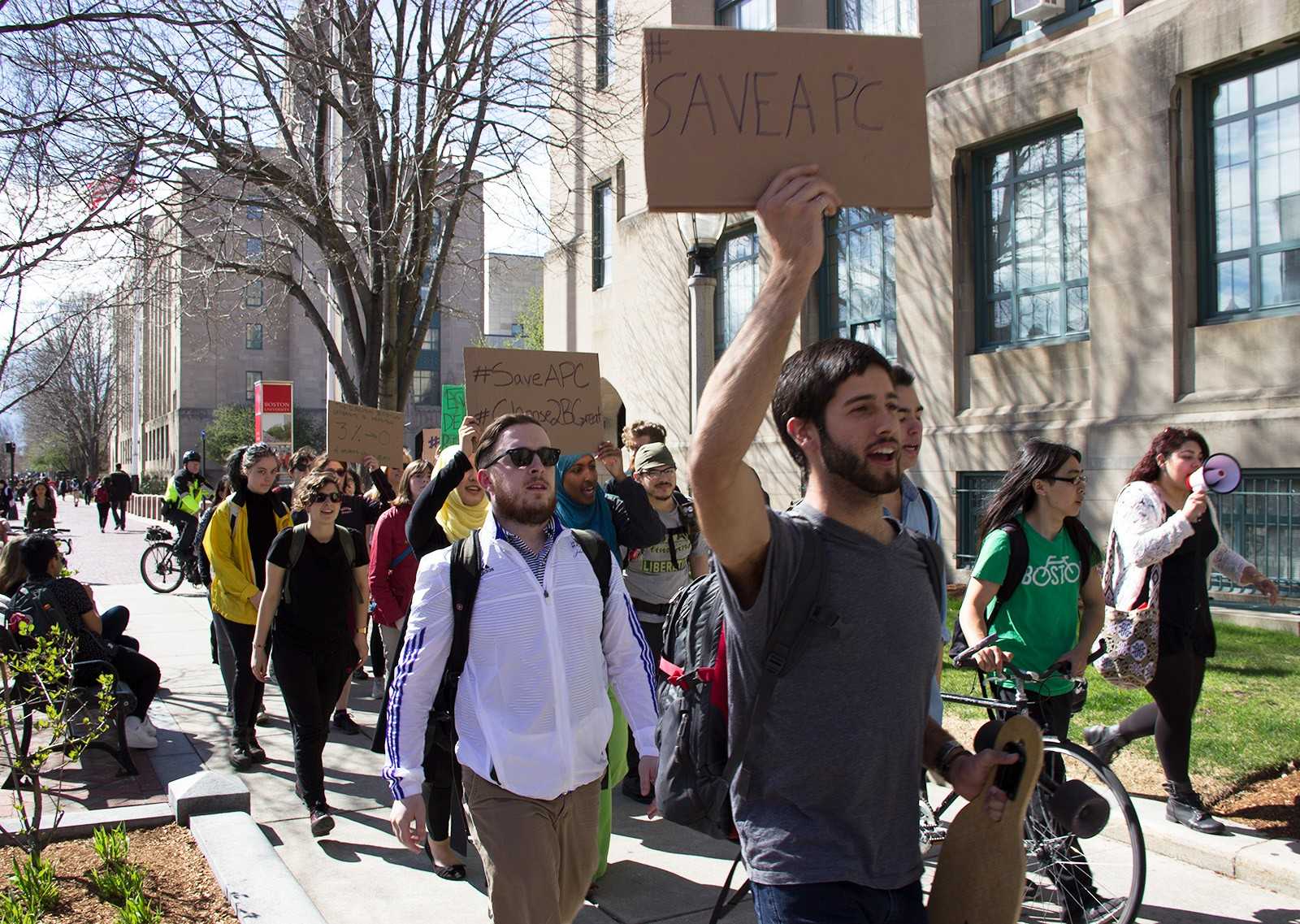[mediagrid cat=”20732″]
The People of Color Coalition at Boston University held a rally on campus Thursday to combat the announced closure of the BU African Presidential Archives and Research Center. BU announced that the center will close on June 30, allegedly for financial reasons, The Daily Free Press reported April 22.
Approximately 50 students and other members of the BU community attended the rally and marched from Marsh Plaza to BU President Robert Brown’s office at 1 Silber Way. Protesters stood outside the building and spoke about the importance of keeping the APARC open and the impact the center has on minority students.
Students chanted phrases like “APC could be me” and “This racism has got to go” while playing drums.
“We see this as an important space for people of color on campus,” said Noor Toraif, a junior in the College of Arts and Sciences and an organizer of the rally from POCC, “for African scholarship and for being hands-on connected with actual people from Africa, who have experiences in Africa, to help students who are in the African Studies program and the International Relations program.”
Toraif said students chose to organize because the center is essential to connecting students, especially those of color, on BU’s campus. Because BU is a global institution, she said, the APARC is crucial to the university’s global identity.
“The African Presidential Center is a kind of resource that a global institution would have, connecting students from the African diaspora and African-American students with leaders in Africa to talk about issues or to just talk about all kinds of academic disciplines and fields,” she said. “So that’s why we decided to organize. We don’t just want that resource to go. We think it’s an important space for scholarship, for identity, for culture and it needs to continue being here.”
Marwa Sayed, a sophomore in CAS and another organizer, said she helped assemble the march because she is interested in promoting diverse scholarship, destroying African stereotypes and educating BU’s students.
“[BU claims] to have a global body and to prepare students for global contacts into which people will be working and for which they will be prepared,” she said. “This building means to me there is a space on campus that students can go to. There’s a space on campus that provides these resources to learn about the African aspects, to learn about yourself and for me — I am not even from the African diaspora — to learn how it plays out in my life and how it will continue to affect my life.”
Several attendees of the rally said they feel the need to keep the APARC open because it advocates for diversity and multicultural education.
Phillipe Copeland, a professor in the School of Social Work, said he attended the rally because he believes the value of black life is something of an open question in American society.
“Whatever the merits behind the decision to close the center, the timing couldn’t be worse for the university,” he said. “It could be misunderstood … as suggesting that black life doesn’t matter. It is something that I don’t believe people in the leadership [at BU] believe themselves, but again given what’s happening in the country, the timing is really, really bad.”
Zainab Kazmi, a junior in the Sargent College of Health and Rehabilitation Sciences, said she believes it is wrong to close the APARC because the center represents the diversity of the BU student body.
“The fact that [the APARC] is there symbolizes the fact that BU at least recognizes that there are so many different ethnicities and cultures around the world, and shutting it done just means that it’s not significant anymore,” she said.
Bianca Bertrand, a sophomore in CAS, said she thinks a lack of diversity initiatives exists on campus, and BU should do more to actively provide for its multicultural community.
“Since they are cutting the [APARC], they really don’t care about the resources available for African-American students,” she said. “And as an African-American student, I feel that is very sad because I know I’ve been going to BU very passively and I think I should be more involved in the community.”
Correction: A previous version of this article misquoted Marwa Sayed saying she is from the African diaspora, when in fact she said she is not from the African diaspora. The article has been edited to reflect this change.


















































































































